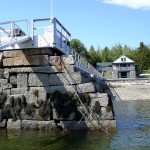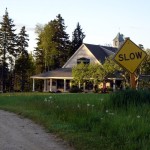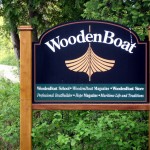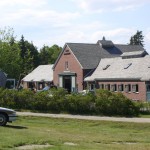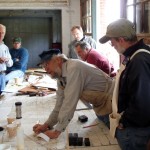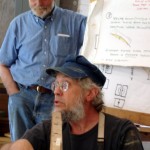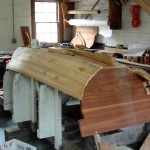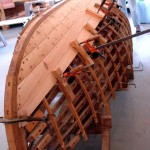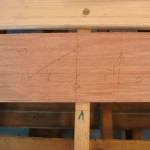It’s been a long time getting started on Harry Bryan’s Fiddlehead decked canoe. A 1:16 scale model was a good preliminary project and served the purpose of learning how the boat goes together. Now, it’s time for the real thing.
Last week, I bought the first few boards, enough to get the framework and bottom together. Harry calls for spruce and Northern White cedar as the first choice lumber, but advises alternatives should those not be available. Northern White cedar is rather plentiful in Harry’s Nova Scotia and in Maine, but not here in New York. The closest Northern White I can find is at the far Eastern end of Connecticut, quite a long drive from here.
My closest supplier of any sort of cedar is Maurice L. Condon in White Plains NY, about 35 miles from here. 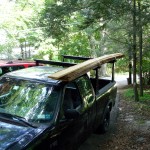 M. L. Condon carries a kind of cedar they call Virginia White. It is actually a juniper and is also known as Atlantic White cedar. It has many of the same properties as Northern White, light in weight, excellent rot resistance, and good strength for its weight.
M. L. Condon carries a kind of cedar they call Virginia White. It is actually a juniper and is also known as Atlantic White cedar. It has many of the same properties as Northern White, light in weight, excellent rot resistance, and good strength for its weight.
I wasn’t quite sure what to expect at Condon. Like most everyone, my lumber yard experiences are mostly at those places that sell construction lumber, the rough stuff we use for framing buildings. Condon is a specialty lumber seller. Most of their stock is hardwood, everything from oak and maple to exotics like purpleheart and ebony. Their softwood stock is also specialty woods such as the cedar I wanted, Western Red cedar, and Sitka spuce. Talk about feeling like the kid in the candy shop! M. L. Condon has what I need for this project, and lots more.
Not long after entering the yard, actually an open area surrounded by storage sheds (most all wood is sheltered from weather while being in open air), William came to help me. We had a short dscussion about what I wanted and he then used a fork lift to open up a stack of cedar and help me select some boards. I came away with four 16 foot long cedar flitches, a 20 foot long 6 inch wide board of sitka spruce and an 8 foot piece of Western Red cedar.
William fork lifted the order onto the truck rack that I recently built. The trip home was uneventful. Service at Condon was excellent, and I now have enough to get started.
Now a bit about the wood and its intended use.
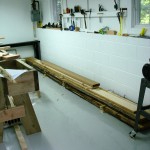 The top piece in the stack is the Western Red cedar. It is the only piece that is surfaced four sides. It is a 2 by 6 of very straight grain, is milled vertical grain, and has a Greenland paddle inside.
The top piece in the stack is the Western Red cedar. It is the only piece that is surfaced four sides. It is a 2 by 6 of very straight grain, is milled vertical grain, and has a Greenland paddle inside.
That 20 foot long piece of Sitka spruce was too long to fit in my workshop, and has been cut to preserve the long lengths needed for the clamps, carlins, and rub rails. That board was not surfaced and measures a full 1 by 6 inches. This board is very clear, with only 4 small knots, none larger than the width of a pinky finger. It’s a beautiful piece of lumber that will provide key structural parts of the boat.
White cedars are sold as “live edge” flitches. They are rough cut, the result of running a complete tree through a saw, and what you get is boards that are four quarters thick and still have bark attached. 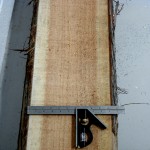 The flitches up in Maine were 20 feet long. These are 16 feet long. The part of the lumber we use for boatbuilding is the heartwood, the center material with the reddish tint. We discard the lighter color sapwood at the edge because it still contains sugars and other semi liquids that are not as impervious to rot as the heartwood. These 12-14 inch boards will yield 8-10 inches of good material. The cedar is also quite clear, with fewer knots than I remember in the cedar we had at the Wooden Boat School in Maine. The bottom of the boat, the planking, and the decks are all cedar.
The flitches up in Maine were 20 feet long. These are 16 feet long. The part of the lumber we use for boatbuilding is the heartwood, the center material with the reddish tint. We discard the lighter color sapwood at the edge because it still contains sugars and other semi liquids that are not as impervious to rot as the heartwood. These 12-14 inch boards will yield 8-10 inches of good material. The cedar is also quite clear, with fewer knots than I remember in the cedar we had at the Wooden Boat School in Maine. The bottom of the boat, the planking, and the decks are all cedar.
I’ll need to triple the size of that stack of lumber to make the full boat, but this is enough to get started. I’ve got wood!
Click on any image to show a larger version.
